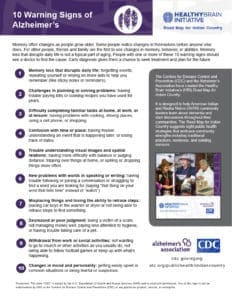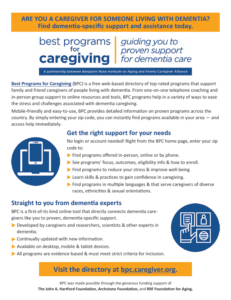Alzheimer’s disease and dementia are very serious and troubling illnesses. Family and friends of those with these illnesses often struggle with how to care for and choosing between what treatment options are available.
Alzheimer’s is a type of dementia that causes problems with memory, thinking and behavior. Symptoms usually develop slowly and get worse over time, becoming severe enough to interfere with daily tasks.
Alzheimer’s is the most common form of dementia, a general term for memory loss and other intellectual abilities serious enough to interfere with daily life. Alzheimer’s disease accounts for 60 to 80 percent of dementia cases.
Alzheimer’s is not a normal part of aging, although the greatest known risk factor is increasing age, and the majority of people with Alzheimer’s are 65 and older. But Alzheimer’s is not just a disease of old age. Up to 5 percent of people with the disease have early onset Alzheimer’s (also known as younger-onset), which often appears when someone is in their 40s or 50s.
Alzheimer’s worsens over time. Alzheimer’s is a progressive disease, where dementia symptoms gradually worsen over a number of years. In its early stages, memory loss is mild, but with late-stage Alzheimer’s, individuals lose the ability to carry on a conversation and respond to their environment. Alzheimer’s is the sixth leading cause of death in the United States. Those with Alzheimer’s live an average of eight years after their symptoms become noticeable to others, but survival can range from four to 20 years, depending on age and other health conditions.
Alzheimer’s has no current cure, but treatments for symptoms are available and research continues. Although current Alzheimer’s treatments cannot stop Alzheimer’s from progressing, they can temporarily slow the worsening of dementia symptoms and improve quality of life for those with Alzheimer’s and their caregivers. Today, there is a worldwide effort under way to find better ways to treat the disease, delay its onset, and prevent it from developing.
The Alzheimer’s Association (AA) partners with the National Indian Council on Aging (NICOA) to promote Alzheimer’s awareness and care and support resources to American Indian and Alaska Native individuals from over 570 tribes across the country. The AA is committed to ending Alzheimer’s disease and related dementias (ADRD). It is the leading voluntary health organization in Alzheimer’s care, support, and research. Collaboration aimed at raising awareness of ADRD in Indian Country has led to presentations at the NICOA conference and a series of educational webinars led by an AA Native community educator.
NICOA enjoys a partnership with the Alzheimer’s Association and the International Association for Indigenous Aging, and hopes you find the following resources beneficial.
Best Programs for Caregiving (BPC) is a free, online directory of top-rated programs that support family and friend caregivers of individuals with dementia. BPC provides detailed information on nearly 50 dementia caregiving programs nationwide, giving family caregivers an invaluable tool for finding proven programs that fit their needs.
You’ll find programs that help you access the resources you need, improve your hands-on skills, reduce stress and enhance your physical and mental well-being. You’ll also see programs that are offered in multiple languages or that serve caregivers of diverse races, ethnicities and sexual orientations.
Additional Resources:
- Best Programs for Caregiving
- Banner Alzheimer’s Institute’s Native American Outreach Program
- Alzheimer’s Association
- Alzheimer’s Association’s Road Map for Indian Country
- Alzheimer’s Fact Sheet
- Alzheimer’s Foundation of America
- Banner Alzheimer’s Institute
- 10 Warnings Signs of Alzheimer’s
- Indian Country Public Health Programs
- Starting Conversations About Alzheimer’s



